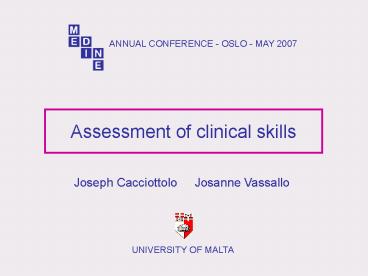Assessment of clinical skills - PowerPoint PPT Presentation
1 / 32
Title:
Assessment of clinical skills
Description:
Eventual medical practice in different environment ... Log books, portofolios, CATs. Exam based vs ... diversity among European medical schools ... – PowerPoint PPT presentation
Number of Views:1078
Avg rating:3.0/5.0
Title: Assessment of clinical skills
1
Assessment of clinical skills
ANNUAL CONFERENCE - OSLO - MAY 2007
Joseph Cacciottolo Josanne Vassallo
UNIVERSITY OF MALTA
2
Assessing clinical skills
- WHY do we need to assess ?
- WHAT do we want to measure ?
3
WHY do we assess ?
In principle
- To ensure safety of patients
- our responsibility to the public
- Achievement of a minimum standard
- responsibility to the candidate and University
4
WHY do we assess ?
In practice the scope
- To ensure competence
- Often as a means of academic competition
5
WHY do we assess ?
In practice the purpose
- Formative to give feedback and advice
- Summative to grade
- Qualificative or licensing
6
WHAT do we measure ?
In principle
- To test not only presence of knowledge
- but also the application of knowledge
7
Several types of clinical assessment
- One model presented in some detail to
- provide a framework for later discussion
8
One model of clinical assessment
In principlea three-fold aim
- Certification of competence - pass / fail
- a state (and legal) requirement
- Grading in rank order
- for employment / placement purposes
- A competition for the award of a prize
9
One model of clinical assessment
In practice
- Measurement of
- adequacy of basic clinical skills
- ability to interpret clinical findings
- facility of communication in practical settings
- ability to think analytically about diagnosis
- ability to discuss management logically
10
Practical steps for assessment
- 6 encounters with different clinical situations
- Two examiners at every encounter, each examiner
giving an individual assessment - Highly structured examination and detailed
assessment of skills - Examiners from other Universities for process
evaluation and quality control
11
Practical steps for assessment
- Encounters with at least six real patients
- Ability to interpret and discuss clinical data
- Management of an emergency scenario
- Appraisal of communication skills and attitude
12
Set-points for testing
Clinical examination of patients
- Attitude to patient
- Actual examination skills
- Presentation of findings
- Clinical judgment
13
Set-points for testing
Interpretation of clinical data
- Evaluation of data
- Significance of data
- Clinical reasoning
14
Set-points for testing
Management of emergency situations
- Ability to solve problems
- Ability to discuss logically
- Clinical judgment and prioritization
- General medical knowledge
15
Set-points for testing
Communication skills
- Attitude to patient
- Ability to communicate well
- Clinical judgment
- General medical knowledge
16
Evaluation
- Subjective evaluation looking in the mirror
- Objective evaluation of outcome
17
Evaluating ourselves
Examinations are formidable even to the
best prepared for the greatest fool may
ask more than the wisest man can answer
Charles Caleb Colton
1780 - 1832
18
Evaluating outcome
Analysis of data to assess effectiveness
- Pattern of results
- Consistency of results
- Patterns of marking
- Process shortcomings
- Basis for improvement
19
What happens to candidates who fail ?
- Review of performance a formative exercise
- Counselling at a personal level
- Specific attention and individual training
- Repeat assessment after a period of time
20
Points for discussion
- Competence versus performance
- Exam based versus continuous assessment
- Methodology related issues
- Organisational issues
21
Competence versus Performance
- In relation to methods used
- Use of core curriculum with additional modules as
required - Eventual medical practice in different
environment - Impact on mobility
22
Competence versus Performance
- In relation to methods used
- Use of core curriculum with additional modules as
required - Eventual medical practice in different
environment - Impact on mobility
23
Competence versus Performance
- In relation to methods used
- Use of core curriculum with additional modules as
required - Eventual medical practice in different
environment - Impact on mobility
24
Competence versus Performance
- In relation to methods used
- Use of core curriculum with additional modules as
required - Eventual medical practice in different
environment - Impact on mobility
25
Exam based vs continuous assessment
- Assessment of a modular curriculum
- Written exams MCQs, SAQ, Essays
- Real-time exams
- Orals clinical / table viva, OSCEs
- Clinical assessment on site mini-CEX, DOPS,
multi-source feedback - Log books, portofolios, CATs
26
Exam based vs continuous assessment
- Assessment of a modular curriculum
- Written exams MCQs, SAQ, Essays
- Real-time exams
- Orals clinical / table viva, OSCEs
- Clinical assessment on site mini-CEX, DOPS,
multi-source feedback - Log-books, portfolios, CATs
27
Methodology-related issues
- Reliability
- Validity
- Practicality
- Transparency
28
Organisational issues
- Resources available
- Student numbers
- Patient availability
- Invasive procedures
- Scheduling
29
Role of grading
- Is there need for grading ?
- Selection process for employment
- Selection for postgraduate training
- Quality of assessment method and performance of
candidates
30
Conclusions
- There is wide diversity among European medical
schools - regarding methods of assessment of clinical
skills - some schools aim at pass/fail outcomes, others
use systems that lead to grading - several quality assurance mechanisms are used to
varying degrees - There is place for widespread application of
agreed - standard methods to
- assess clinical competences in core curricula
- assess additional competences essential to
individual practice
31
UNIVERSITY OF MALTA MEDICAL SCHOOL 1676 - 2007
EU UNIVERSITY PARTNER
? joseph.cacciottolo_at_um.edu.mt ?
josanne.vassallo_at_um.edu.mt
32
ANNUAL CONFERENCE - OSLO - MAY 2007
Thank you






























![[PDF] Health Assessment for Nursing Practice 7th Edition Android PowerPoint PPT Presentation](https://s3.amazonaws.com/images.powershow.com/10078624.th0.jpg?_=202407151211)
![[PDF] Pediatric Skills for Occupational Therapy Assistants 5th Edition Kindle PowerPoint PPT Presentation](https://s3.amazonaws.com/images.powershow.com/10085915.th0.jpg?_=20240726126)